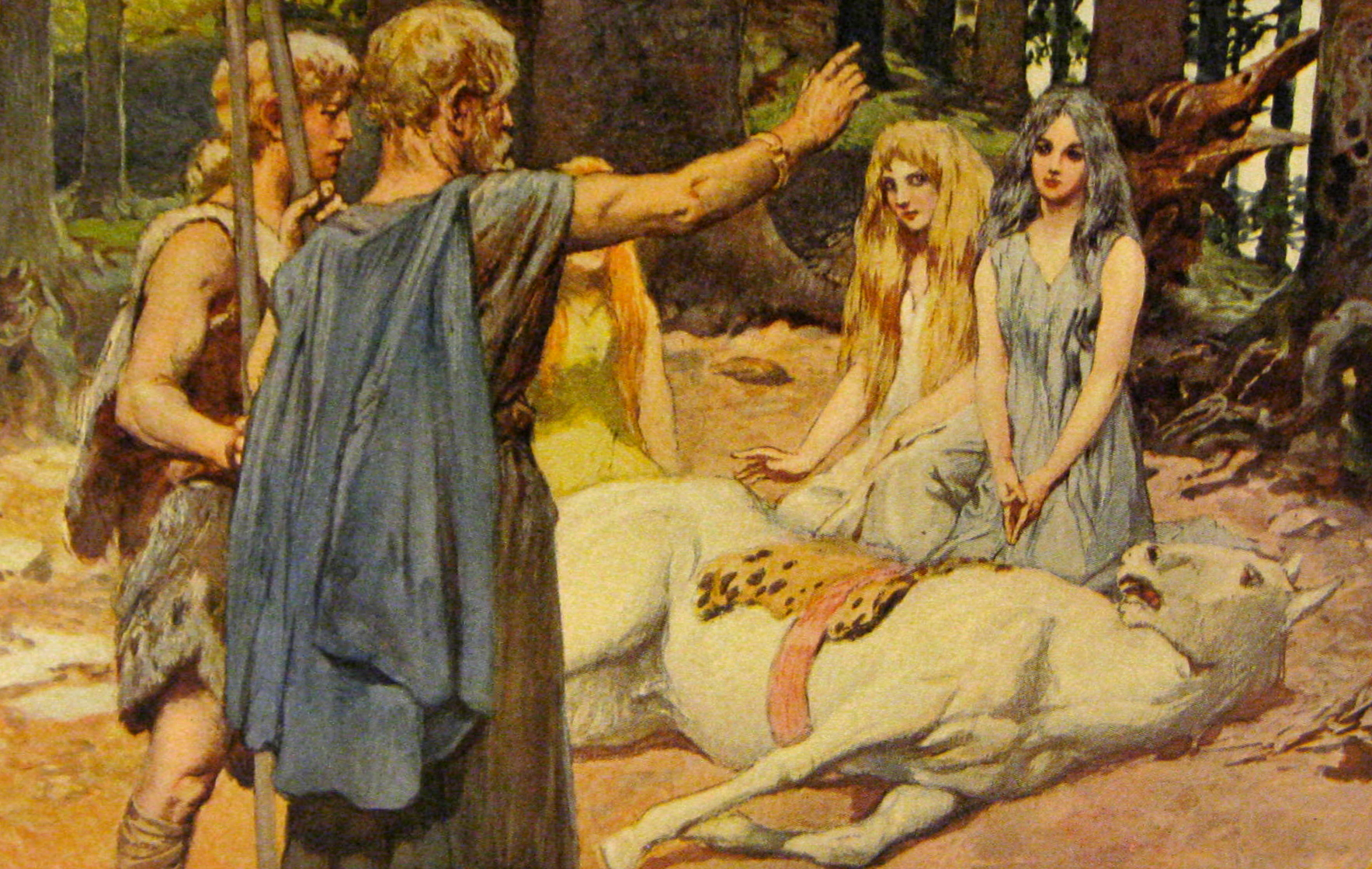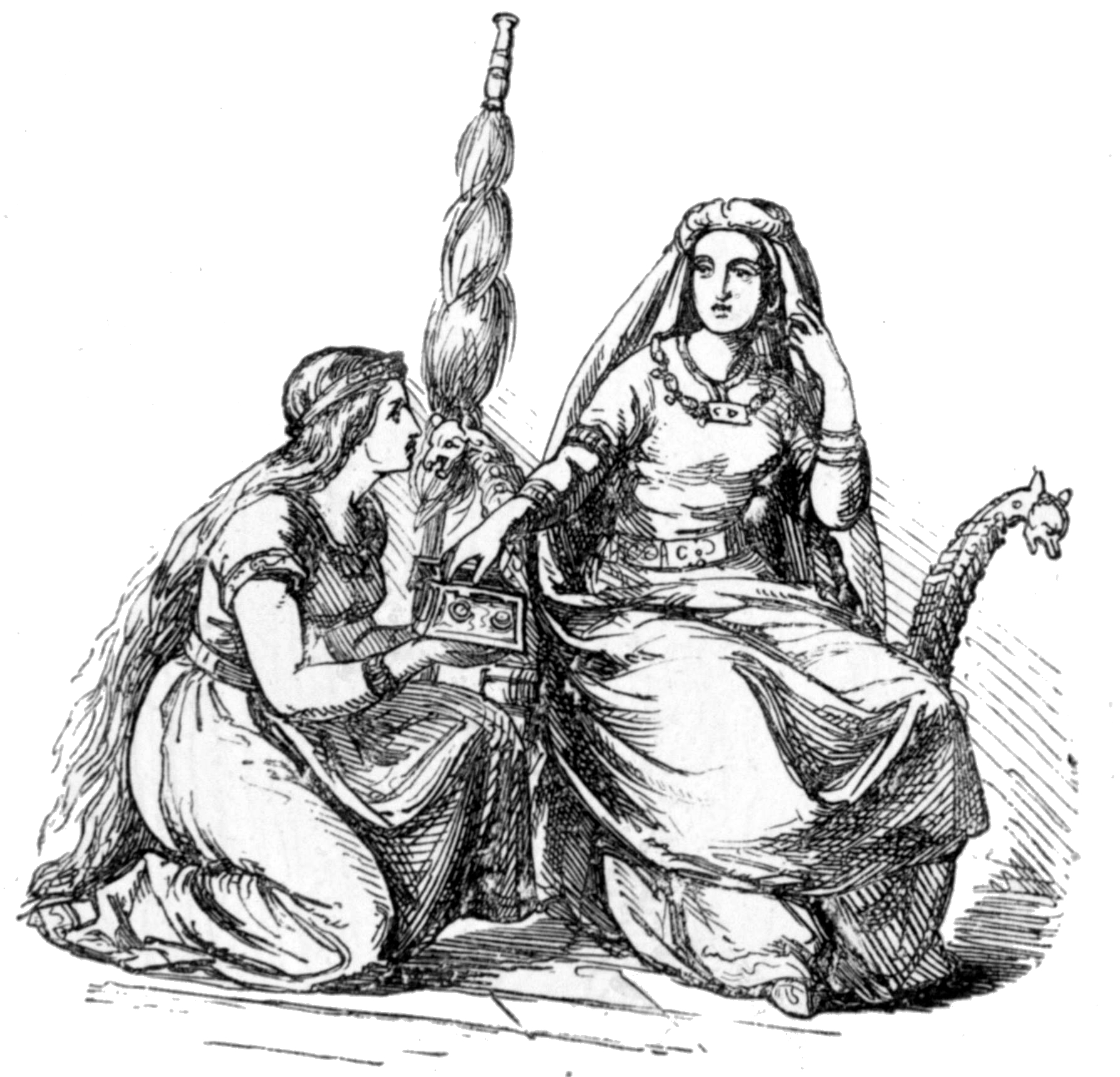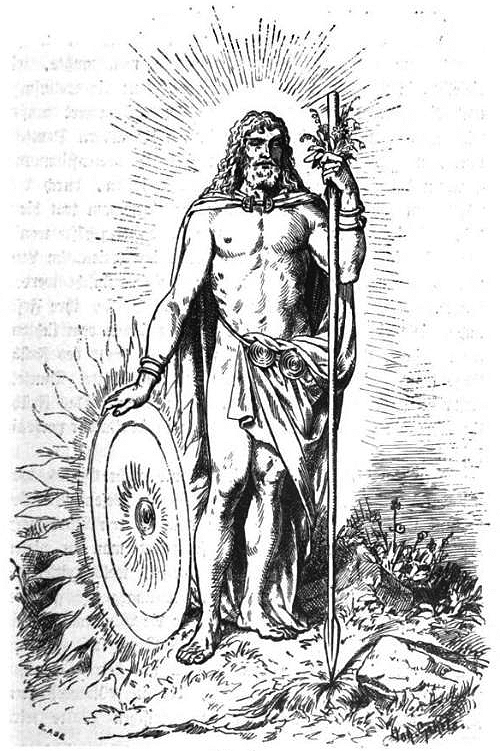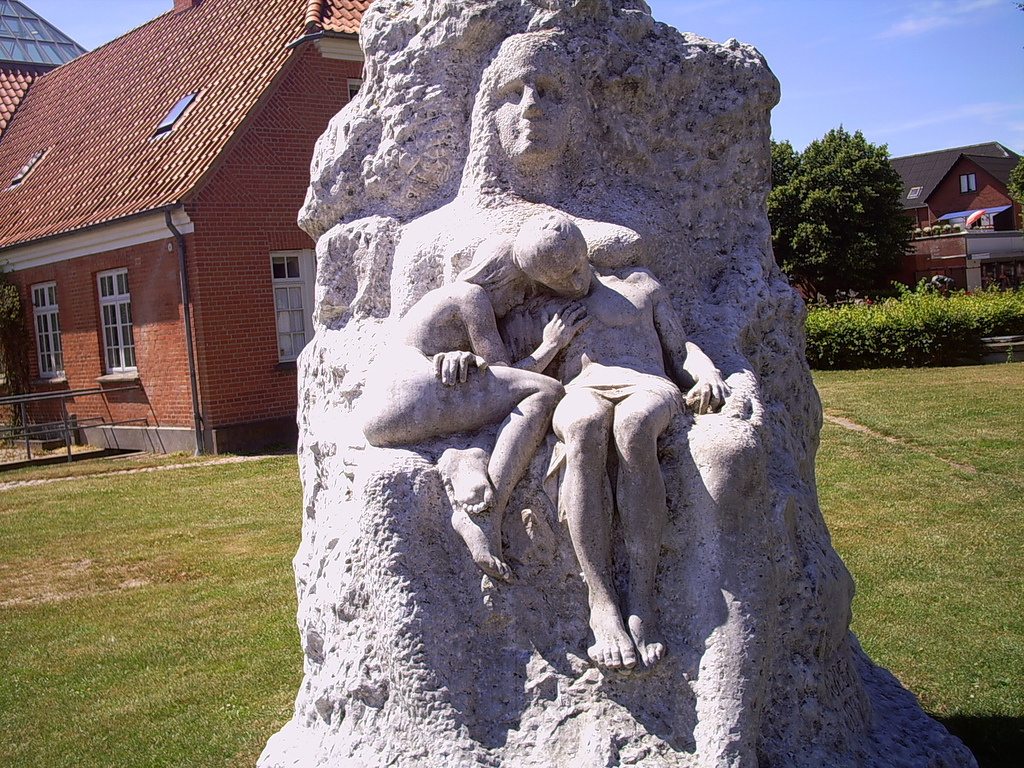|
Frigg
Frigg (; Old Norse: ) is a goddess, one of the Æsir, in Germanic mythology. In Norse mythology, the source of most surviving information about her, she is associated with marriage, prophecy, clairvoyance and motherhood, and dwells in the wetland halls of Fensalir. In wider Germanic mythology, she is known in Old High German as , in Langobardic as , in Old English as , in Old Frisian as ''Frīa'', and in Old Saxon as , all ultimately stemming from the Proto-Germanic theonym *'' Frijjō''. Nearly all sources portray her as the wife of the god Odin. In Old High German and Old Norse sources, she is specifically connected with Fulla, but she is also associated with the goddesses Lofn, Hlín, Gná, and ambiguously with the Earth, otherwise personified as an apparently separate entity Jörð (Old Norse: 'Earth'). The children of Frigg and Odin include the gleaming god Baldr. The English weekday name Friday (ultimately meaning 'Frigg's Day') bears her name. After Christianiza ... [...More Info...] [...Related Items...] OR: [Wikipedia] [Google] [Baidu] |
Frigg By Doepler
Frigg (; Old Norse: ) is a goddess, one of the Æsir, in Germanic mythology. In Norse mythology, the source of most surviving information about her, she is associated with marriage, prophecy, clairvoyance and motherhood, and dwells in the wetland halls of Fensalir. In wider Germanic mythology, she is known in Old High German as , in Langobardic as , in Old English as , in Old Frisian as ''Frīa'', and in Old Saxon as , all ultimately stemming from the Proto-Germanic theonym *'' Frijjō''. Nearly all sources portray her as the wife of the god Odin. In Old High German and Old Norse sources, she is specifically connected with Fulla, but she is also associated with the goddesses Lofn, Hlín, Gná, and ambiguously with the Earth, otherwise personified as an apparently separate entity Jörð (Old Norse: 'Earth'). The children of Frigg and Odin include the gleaming god Baldr. The English weekday name Friday (ultimately meaning 'Frigg's Day') bears her name. After Christianizati ... [...More Info...] [...Related Items...] OR: [Wikipedia] [Google] [Baidu] |
Fulla
Fulla (Old Norse: , possibly 'bountiful') or Volla (Old High German, 'plenitude') is a goddess in Germanic mythology. In Norse mythology, Fulla is described as wearing a golden band and as tending to the ashen box and the footwear owned by the goddess Frigg, and, in addition, Frigg confides in Fulla her secrets. Fulla is attested in the ''Poetic Edda'', compiled in the 13th century from earlier traditional sources; the ''Prose Edda'', written in the 13th century by Snorri Sturluson; and in skaldic poetry. Volla (''Folla'') is attested in the "Horse Cure" Merseburg Incantation, recorded anonymously in the 10th century in Old High German, in which she assists in healing the wounded foal of Phol and is referred to as Frigg's sister. Scholars have proposed theories about the implications of the goddess. Name The Old Norse name ''Fulla'' has been translated as 'bountiful'. It stems from Proto-Germanic ''*fullōn'' ('fullness, plenitude'; cf. Gothic ''fullo'' 'fullness', OHG ''foll ... [...More Info...] [...Related Items...] OR: [Wikipedia] [Google] [Baidu] |
Fensalir
In Norse mythology, Fensalir (Old Norse "Fen Halls"Orchard (1997:43).) is a location where the goddess Frigg dwells. Fensalir is attested in the ''Poetic Edda'', compiled in the 13th century from earlier traditional sources, and the ''Prose Edda'', written in the 13th century by Snorri Sturluson. Scholars have proposed theories about the implications of the location, including that the location may have some connection to religious practices involving springs, bogs, or swamps in Norse paganism, and that it may be connected to the goddess Sága's watery location Sökkvabekkr. Attestations In the ''Poetic Edda'' poem ''Völuspá'', Frigg is described as weeping over her son Baldr's death in Fensalir. This stanza is absent in the '' Hauksbók'' manuscript of the poem.Lindow (2001:114). The portion of the stanza mentioning Fensalir foretells that vengeance will come for the death of Baldr and that: :while Frigg wept :in Fen Halls :for Valhǫll's woe.Dronke (1997:16). In chapter ... [...More Info...] [...Related Items...] OR: [Wikipedia] [Google] [Baidu] |
Hlín
In Norse mythology, Hlín () is a goddess associated with the goddess Frigg. Hlín appears in a poem in the ''Poetic Edda'', compiled in the 13th century from earlier traditional sources, the ''Prose Edda'', written in the 13th century by Snorri Sturluson, and in kennings found in skaldic poetry. Scholars have debated whether the stanza referring to her in the ''Prose Edda'' refers to Frigg. ''Hlín'' serves as a given name in Iceland, and Hlín receives veneration in the modern era in Germanic paganism's modern extension, Heathenry. Etymology Scholars frequently explain the meaning behind the goddess's name as 'protector'.See, for example, Orchard (1997:86) and Lindow (2001:177). The ''Prose Edda'' section ''Gylfaginning'' derives the name from a verb found in a proverb in an obscure and otherwise unattested Old Norse proverb: ''Þiaðan af er þat orðtak at sá er forðask hleinir''. Scholars generally accept that the theonym ''Hlín'' derives from the verb ''hleina''. However, ... [...More Info...] [...Related Items...] OR: [Wikipedia] [Google] [Baidu] |
Frijjō
''*Frijjō'' ("Frigg-Frija") is the reconstructed name or epithet of a hypothetical Common Germanic love goddess, the most prominent female member of the ''* Ansiwiz'' (gods), and often identified as the spouse of the chief god, *''Wōdanaz'' (''Woden-Odin''). Proposed etymology The name ''*Frijjō'' (Old Norse ''Frigg'', Old High German ''Frīja'') ultimately derives from Proto-Indo-European ''*prih-y(a)h'', cognate to Sanskrit ''priya'' "dear, beloved". However, in the Germanic languages, the word's meaning split into two etymons: one related to the semantic field of "love, courtship, friendship" (English '' friend''), whereas the other to the field of "freedom" (English '' free''). Other cognates are: * Gothic ''frijôn'' - translates φιλειν, αγαπαν "to love". * Anglo-Saxon ''freogan'', ''freon'' * Old Saxon ''friehan''. * Modern Germanic words for '' friend'', such as ''Freund''. The Old High German verb ''frijôn'' "''nubere, uxorem ducere'', woo, to take a w ... [...More Info...] [...Related Items...] OR: [Wikipedia] [Google] [Baidu] |
Odin
Odin (; from non, Óðinn, ) is a widely revered god in Germanic paganism. Norse mythology, the source of most surviving information about him, associates him with wisdom, healing, death, royalty, the gallows, knowledge, war, battle, victory, sorcery, poetry, frenzy, and the runic alphabet, and depicts him as the husband of the goddess Frigg. In wider Germanic mythology and paganism, the god was also known in Old English as ', in Old Saxon as , in Old Dutch as ''Wuodan'', in Old Frisian as ''Wêda'', and in Old High German as , all ultimately stemming from the Proto-Germanic theonym *''Wōðanaz'', meaning 'lord of frenzy', or 'leader of the possessed'. Odin appears as a prominent god throughout the recorded history of Northern Europe, from the Roman occupation of regions of Germania (from BCE) through movement of peoples during the Migration Period (4th to 6th centuries CE) and the Viking Age (8th to 11th centuries CE). In the modern period, the rural folklore of Germanic E ... [...More Info...] [...Related Items...] OR: [Wikipedia] [Google] [Baidu] |
Baldr
Baldr (also Balder, Baldur) is a god in Germanic mythology. In Norse mythology, Baldr (Old Norse: ) is a son of the god Odin and the goddess Frigg, and has numerous brothers, such as Thor and Váli. In wider Germanic mythology, the god was known in Old English as , and in Old High German as , all ultimately stemming from the Proto-Germanic theonym ('hero' or 'prince'). During the 12th century, Danish accounts by Saxo Grammaticus and other Danish Latin chroniclers recorded a euhemerized account of his story. Compiled in Iceland during the 13th century, but based on older Old Norse poetry, the '' Poetic Edda'' and the ''Prose Edda'' contain numerous references to the death of Baldr as both a great tragedy to the Æsir and a harbinger of Ragnarök. According to '' Gylfaginning'', a book of Snorri Sturluson's Prose Edda, Baldr's wife is Nanna and their son is Forseti. Baldr had the greatest ship ever built, Hringhorni, and there is no place more beautiful than his hall, ... [...More Info...] [...Related Items...] OR: [Wikipedia] [Google] [Baidu] |
Æsir
The Æsir (Old Norse: ) are the gods of the principal pantheon in Norse religion. They include Odin, Frigg, Höðr, Thor, and Baldr. The second Norse pantheon is the Vanir. In Norse mythology, the two pantheons wage war against each other, resulting in a unified pantheon. Unlike the Old English word ''god'' (and the Old Norse word '), Æsir was never converted over to Christian use. Etymology ''Æsir'' is the plural of '' áss'', ''ǫ́ss'' "god". In genitival compounds, it takes the form ', e.g. in ' ("Thor of the Æsir"), besides ' found in : '' ás-brú'' "gods' bridge" (the rainbow), : ' "gods' enclosure", : ' "gods' kin", : ' "gods' leader", : ' "gods' might" (especially of Thor), : ' "divine wrath" etc. : ' "national god" (') is a title of Thor, as is : ' "almighty god", while it is Odin who is "the" '. There is also Old East Norse dialectal : *''ās-ækia'' (OWN: *''áss-ekja''), i.e. "god ride" (Thor riding in his wagon), resulting in the modern Swedish word : '' ... [...More Info...] [...Related Items...] OR: [Wikipedia] [Google] [Baidu] |
Gná And Hófvarpnir
In Norse mythology, Gná (Old Norse: ) is a goddess who runs errands in other worlds for the goddess Frigg and rides the flying, sea-treading horse Hófvarpnir (O.N.: , "he who throws his hoofs about",Simek (2007:157). "hoof-thrower"Lindow (2001:146). or "hoof kicker"Byock (2005:43).). Gná and Hófvarpnir are attested in the ''Prose Edda'', written in the 13th century by Snorri Sturluson. Scholarly theories have been proposed about Gná as a "goddess of fullness" and as potentially cognate to Fama from Roman mythology. Hófvarpnir and the eight-legged steed Sleipnir have been cited examples of transcendent horses in Norse mythology. Attestations In chapter 35 of the ''Prose Edda'' book ''Gylfaginning'', the enthroned figure of High provides brief descriptions of 16 ásynjur. High lists Gná thirteenth, and says that Frigg sends her off to different worlds to run errands. High adds that Gná rides the horse Hófvarpnir, and that this horse has the ability to ride through the air ... [...More Info...] [...Related Items...] OR: [Wikipedia] [Google] [Baidu] |
Friday
Friday is the day of the week between Thursday and Saturday. In countries that adopt the traditional "Sunday-first" convention, it is the sixth day of the week. In countries adopting the ISO-defined "Monday-first" convention, it is the fifth day of the week. In most Western countries, Friday is the fifth and final day of the working week. In some other countries, Friday is the first day of the weekend, with Saturday the second. In Israel, Friday is the sixth day of the week. In Iran, Friday is the last day of the weekend, with Saturday as the first day of the working week. Bahrain, the United Arab Emirates (UAE), Saudi Arabia and Kuwait also followed this convention until they changed to a Friday–Saturday weekend on September 1, 2006, in Bahrain and the UAE, and a year later in Kuwait. The UAE changed its weekend from Friday-Saturday to Saturday-Sunday on January 1, 2022. Etymology The name ''Friday'' comes from the Old English ', meaning the "day of Frig", a result of ... [...More Info...] [...Related Items...] OR: [Wikipedia] [Google] [Baidu] |
Lofn
In Norse mythology, Lofn (Old Norse: , possibly "comforter,"Orchard (1997:104). "the comforter, the mild,"Simek (2007:190). or "loving"Byock (2005:168).) is a goddess. Lofn is attested in the ''Prose Edda'', written in the 13th century by Snorri Sturluson and in kennings found in skaldic poetry. In the ''Prose Edda'', Lofn is described as gentle in manner and as an arranger of marriages, even when they have been forbidden. Scholars have proposed theories about the implications of the goddess. Attestations In chapter 35 of the ''Prose Edda'' book ''Gylfaginning'', High provides brief descriptions of 16 ásynjur. High lists Lofn eighth and about her says that: :'She is so gentle and so good to invoke that she has permission from All-Father or Frigg to arrange unions between men and women, even if earlier offers have been received and unions have been banned. From her name comes the word ''lof'', meaning permission as well as high praise.'Byock (2005:43). In the ''Prose Edda'' book ... [...More Info...] [...Related Items...] OR: [Wikipedia] [Google] [Baidu] |
Jörð
Jörð ( non, Jǫrð, lit=earth) is the personification of earth and a goddess in Norse mythology. She is the mother of the thunder god Thor and a sexual partner of Odin. Jörð is attested in Danish historian ''Gesta Danorum'', composed in the 12th century by Danish historian Saxo Grammaticus; the ''Poetic Edda'', compiled in the 13th century by an unknown individual or individuals; and the ''Prose Edda'', also composed in the 13th century. Her name is often employed in skaldic poetry and kennings as a poetic term for land or earth. Name Etymology Old Norse means 'earth, land', serving both as a common noun ('earth') and as a theonymic incarnation of the noun ('Earth-goddess'). It stems from Proto-Germanic ''*erþō''- ('earth, soil, land'), as evidenced by the Gothic , Old English , Old Saxon , or Old High German (OHG) . The Ancient Greek word (; 'earth') is also possibly related. The word is most likely cognate with Proto-Germanic ''*erwa'' or ''erwōn-'', meaning 'sa ... [...More Info...] [...Related Items...] OR: [Wikipedia] [Google] [Baidu] |








